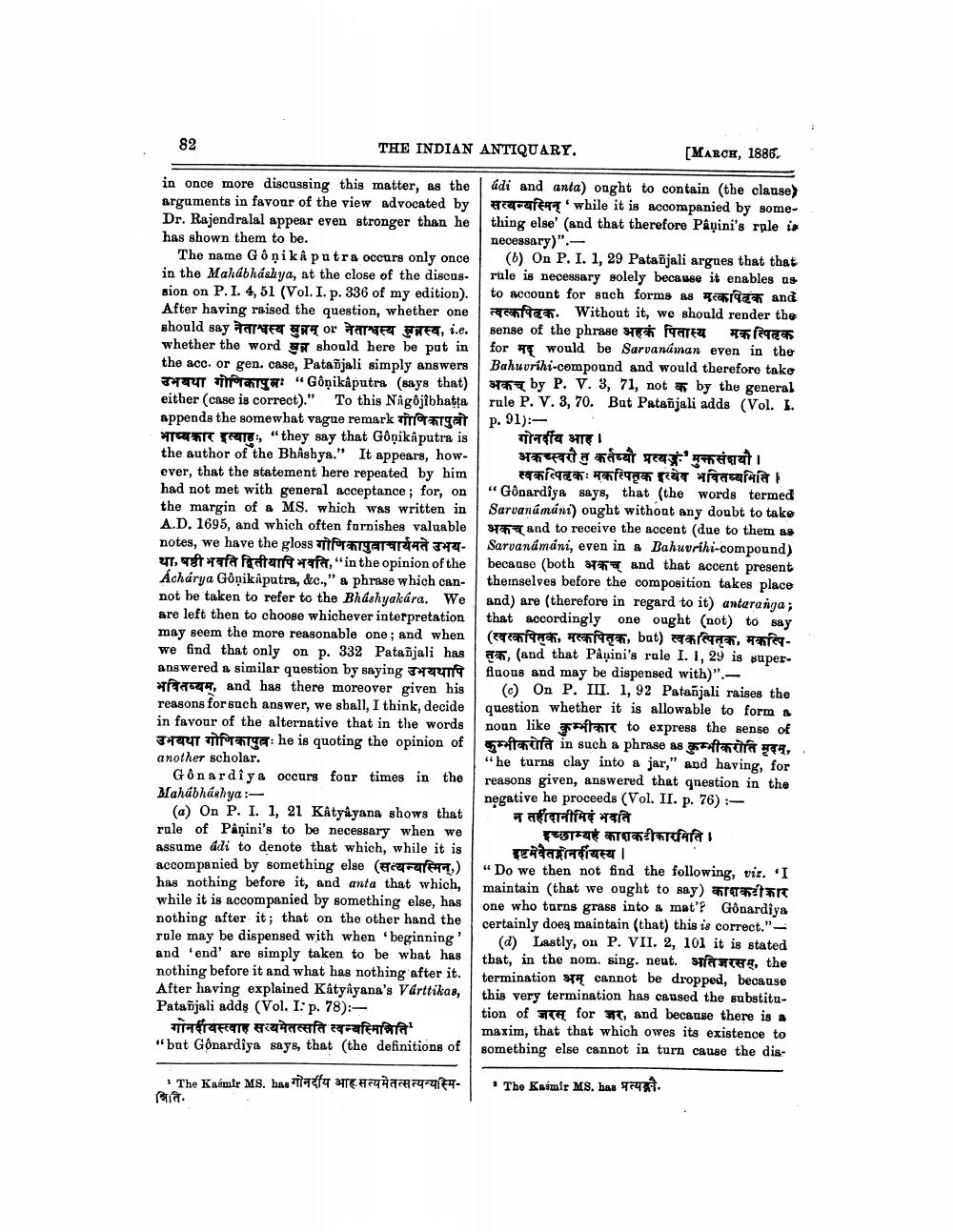________________
82
THE INDIAN ANTIQUARY.
[MARCH, 1886.
in once more discussing this matter, as theúdi and anta) ought to contain (the clanse) arguments in favour of the view advocated by fery' while it is accompanied by someDr. Rajendralal appear even stronger than he thing else' (and that therefore Payini's rule is has shown them to be.
necessary)".The name Gôņika putra occurs only once (6) On P. I. 1, 29 Patañjali argues that that in the Mahabháshya, at the close of the discus. rule is necessary solely because it enables us sion on P. I. 4,51 (Vol. I. p. 336 of my edition). to account for such forms as 19h and After having raised the question, whether one one Without it, we should render the should say T OR or TART N4, i.e. sense of the phrase 978 YTJ Arqa whether the word un should here be put in for hy would be Sarvanáman even in the the acc. or gen. case, Patañjali simply answers Bahuvrihi-compound and would therefore take TTTT Praca “Gôņikåputra (says that) by P. V. 3, 71, not by the general either case is correct)." To this Nagôjibhatta rule P. V. 3, 70. But Patañjali adds (Vol. I. appends the somewhat vague remark Tragat p. 91):
T2 TROTU, "they say that Goņika putra is गोनीय आह। the author of the Bhashya." It appears, how- अकस्वरोतु कर्तव्यो प्रत्यङ्ग'मुक्तसंशयो। ever, that the statement here repeated by him स्वकल्पिकः मकस्पितृक इत्येव भवितव्यमिति । had not met with general acceptance; for, on “Gônardiya says, that the words termed the margin of a MS. which was written in Sarvaná máni) ought without any doubt to take A.D. 1695, and which often furnishes valuable sahand to receive the accent (due to them as notes, we have the gloss Tifalgar A T Sarvanámáni, even in a Bahuurihi-compound) था, षष्ठीभवति द्वितीयापि भवति, "in the opinion of the becanse (both अकच and that accent present Acharya Göņikåputra, &c.," a phrase which can- themselves before the composition takes place not be taken to refer to the Bhashyakára. We and) are (therefore in regard to it) antaranya; are left then to choose whichever interpretation that accordingly one ought (not) to say may seem the more reasonable one; and when (range, Hauen, bat) TRTEK, 1. we find that only on p. 332 Patañjali has , (and that Påņini's rale I. 1, 29 is superanswered a similar question by saying 322 fluous and may be dispensed with)".for, and has there moreover given his (6) On P. III. 1, 92 Patanjali raises the reasons for such answer, we sball, I think, decide question whether it is allowable to form a in favour of the alternative that in the words noun like far to express the sense of उभयथा गोणिकापुनः he is quoting the opinion of | कुम्भीकरोति in such aphrase as कुम्भीकरोति मृदम्, another scholar.
"he turns clay into a jar," and having, for Gônardiya occurs four times in the reasons given, answered that onestion in the Mahábhashya:
negative he proceeds (Vol. II. p. 76) :(a) On P. I. 1, 21 Katyayana shows that न तहीदानीमिदं भवति । rule of Paņini's to be necessary when we
इच्छाम्यहं काशकटीकामिति । assume adi to denote that which, while it is इष्टमेवैतकोनीयस्य । accompanied by something else (Ecrafen) Do we then not find the following, viz. 'I has nothing before it, and anta that which, maintain that we ought to say) antar while it is accompanied by something else, has one who turns grass into a mat'P Gônardiya nothing after it; that on the other hand the
certainly does maintain (that) this is correct." - role may be dispensed with when beginning' (d) Lastly, on P. VII. 2, 101 it is stated and 'end' are simply taken to be what has that, in the nom. sing. neut. SÍTTES, the nothing before it and what has nothing after it.
termination cannot be dropped, because After having explained Katyayana's Varttikas,
this very termination has caused the substituPatañjali adds (Vol. I: p. 78):
tion of for wt, and because there is a गोनीयस्वाह सत्यमेतत्सति स्वन्बस्मिन्निति' maxim, that that which owes its existence to "but Gộnardiya says, that (the definitions of something else cannot in turn cause the dis
* The Kasmir MS. has Taf TEHTYÀSH2H-
The Kaimir MS. has 4546.




